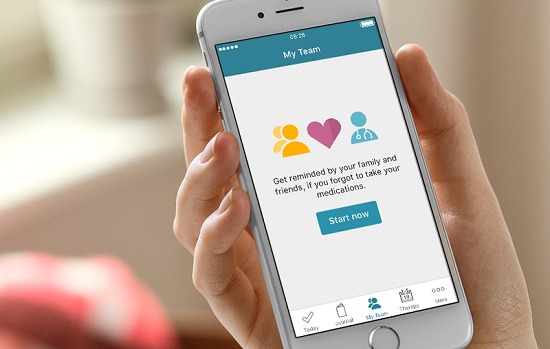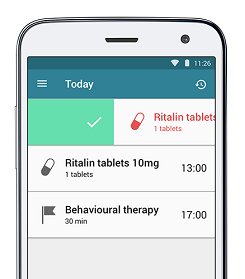Additional Support for ADHD: A Health Tracker App to Help with Medication Management and Symptom Control
If You or Your Child Has ADHD, It Is Important That You Take Medication and Attend Therapy Sessions to Manage the Symptoms. Here’s a Practical App That Can Help You Manage ADHD as Effectively as Possible

Attention deficit hyperactivity disorder, commonly referred to by its acronym, ADHD, is a behavioral and mental condition that is mostly diagnosed in children. It leads to severe and persistent inattention, hyperactivity, and impulsivity. If left untreated, the behavioral patterns have a great impact on the child’s school and social life and may cause problems in adulthood such as substance abuse or addiction, relationship difficulties, depression, crime, and chronic lateness and forgetfulness. The good news is that treatment is available in the form of medication and therapy. However, it can be difficult to remember medication and therapy sessions. If your child (or you) has ADHD, smartphone health apps can offer you the additional support you need.
MyTherapy was developed to help patients with long-term health conditions such as ADHD. It generates reminders, which can help you, as the parent, keep track of various aspects of your child’s therapy and treatment. For example, MyTherapy generates pill reminders that will help your child to not miss a dose of his/her required ADHD medication. In the early stages of treatment, your doctor will usually adjust the dosages to find the one that works best. Therefore, the app’s reminders can be adjusted to specify the exact timing and dosage of the drug as per prescribed instructions. In addition to the reminders for medication intake, the reminders can be used as a diary to remind you of any upcoming doctor’s appointments, parent-teaching programs, or group-therapy sessions.
MyTherapy also comes with a built-in health diary. The diary can be used to monitor the side effects of the medication and the efficacy and progress of your child’s treatment. It also lets you record various symptoms of the disorder and any necessary health measurements such as weight, pulse, and blood pressure. The health diary records this data and this information is then compiled into a comprehensive health and progress report that can be printed out and shared with your doctor. This report can help determine if your child is receiving the right dosage of a drug and whether the general treatment plan is effective. Moreover, MyTherapy has a useful feature that informs you when your child has forgotten to take his/her medication.
We, at MyTherapy, value feedback from our users as it helps us stay on top of our game and ensures that we continuously deliver a product that is tailored to our users’ needs. We want to keep the app as user-friendly and as practical as possible and we have developed this app to offer parents some structured support in monitoring their child’s behavior, reducing their symptoms, and improving their school and social life.
ADHD Versus “Normal Growing-Up Behavior”
ADHD is a common behavioral disorder that mainly affects children, causing them to be inattentive, hyperactive, and impulsive. As most individuals (children in particular) display these behaviors from time to time, it may be difficult to distinguish the symptoms of ADHD from “normal growing up behavior”. The key difference is that with ADHD, the inattention, hyperactivity, and impulsivity are substantially more persistent and severe and cause significant problems in school, social settings, and home life. Moreover, the condition may impact on the child’s intellectual, psychological, and social development.
ADHD is mostly diagnosed between the ages of six and 12. The worldwide prevalence of ADHD in children is about 5% and surveys of children in the UK indicate that about 4% of boys and 1% of girls have the disorder. Usually, the symptoms improve with age but many adults. who were diagnosed with ADHD in the childhood or teenage years, may continue to experience problems with things like time-management, being organized, and setting goals. It is also possible for adults to be diagnosed with ADHD without having a history of the disorder.
The 3 Categories of Symptoms
The symptoms of ADHD can be grouped into three different categories: inattention, hyperactivity, and impulsivity. Usually, children have symptoms that fall into all of these categories, but this is not always the case. It is also possible for children to have symptoms from only one of the categories.
The symptoms of inattention include:
- A short attention span and being easily distracted
- Losing things and being forgetful
- Making careless mistakes
- Being unable to listen and follow instructions
- Difficulties in organizing tasks
- Constantly changing activities or tasks
The symptoms of hyperactivity include:
- Not being able to sit still and constantly fidgeting
- Excessive talking and interrupting conversations
- Impatient
- Performing actions without thinking
- Little sense of danger
The symptoms for impulsivity include:
- Causing disruption during lessons
- Blurting out answers
- Interrupting others
In adults, the symptoms may be more difficult to define. Although some of the above symptoms may be applied to adults, various experts believe that the behavioral cluster of hyperactivity, impulsiveness, and inattentiveness affects adults in different ways. For instance, adults with the disorder may be unable to focus, prioritize, and deal with stress and experience mood swings and short tempers. In some cases, these adults may also experience anxiety and depression.
There is no single test to diagnose ADHD. A specialist (e.g. a pediatrician or child psychiatrist) will assess the child. This may involve a physical examination, a discussion with the parents and child, observing the child doing certain tasks, or asking for a school report. For the specialist to diagnose ADHD, a set of strict criteria needs to be fulfilled. For example, the symptoms need to be present for at least six months in more than one setting (e.g. home and school). In addition, the symptoms must be causing significant problems for the child (e.g. at a social or academic level) and not be attributed to any other condition (e.g. depression or anxiety).
The Causes of ADHD Remain Unknown
It is speculated that ADHD may be caused by small changes in the parts of the brain that are responsible for impulses and concentration. However, the exact cause of ADHD is not known. Various risk factors have been identified that may increase the chance of a child being diagnosed with ADHD. These include:
- Having a family history of ADHD. Certain genes have been identified that appear to be linked to ADHD. These can be passed on from parents to children.
- Chemical imbalances in the brain.
- Areas of the brain that control attention are less active in children with ADHD.
- Problems during birth. These may include a lack of oxygen to the brain or low birth weight.
- Smoking, drinking, or taking drugs during pregnancy.
- Severe deprivation or neglect of the child during early life.
Medication and Therapy for ADHD
The type of treatment recommended for ADHD depends on the severity of the condition and various characteristics of the child. ADHD can neither be prevented nor cured and the aim of the treatment is to relieve and manage the symptoms. This can be achieved with a combination of medication, a good education plan, and therapy.
The medicines licensed for ADHD treatment include: methylphenidate, dexamfetamine, lisdexamfetamine, atomoxetine, and guanfacine. Methylphenidate (known as Ritalin) is the most common drug used to treat ADHD. It increases a certain brain chemical called dopamine in the parts of the brain that are responsible for self-control and attention. The medication therefore helps the child focus and improve concentration. If methylphenidate causes difficult-to-manage side effects then dexamfetamine or atomoxetine are the next treatments of choice.
Some of these treatments need to be taken every day, others just on school days. When beginning treatment, your child will probably be given small doses, which will then be gradually increased to determine the optimal prescription amount. While on medication, which may be taken for several years, it is imperative that your child goes for regular check-ups to determine efficacy and managing side effects. It is also important to measure height, weight, blood pressure, and pulse at regular intervals.
In addition to medication, various forms of therapy are useful in helping children with ADHD. These therapies focus on changing your child’s behavior and include:
- Special education tailored to the needs of the child. Structure and routine are proven to help children with ADHD significantly.
- Psychotherapy (counselling) can help people with ADHD learn how to handle their emotions and frustrations, which, in turn, improve their self-esteem. Counselling can also help families better understand the child or adult with ADHD.
- Having a team of professionals on hand, including a doctor, teacher, nurse, social worker, occupational therapist, and mental healthcare professional for holistic care and treatment.
Start Mytherapy for Peace of Mind
ADHD is a behavioral disorder that can have a significant impact on your child’s success in academic, occupational, and social areas of life. With the right treatment, however, it is possible to reduce the symptoms and thereby improve your child’s behavior and opportunities. MyTherapy, an app developed by smartpatient, was developed to support parents and guardians in managing their child’s ADHD. The app creates reliable reminders that can help you, the parent or guardian, give your child the right amount of medication at the right time and remind you of upcoming therapy sessions or doctor’s appointments. In addition, the app includes a health journal, which allows you to monitor your child’s treatment by recording symptoms, side effects, and health measurements. The health diary, along with other data you’ve recorded in the app, can be printed out and shared with a doctor, who can use it to adjust the treatment plan for a more successful outcome. MyTherapy was designed to give parents and guardians peace of mind about their child’s development and some structured support when it is most needed.


